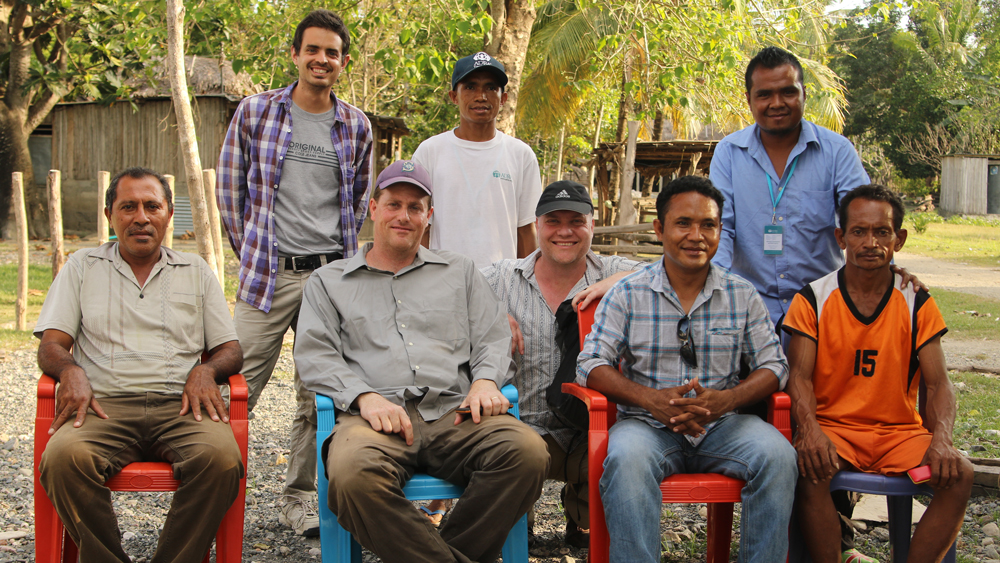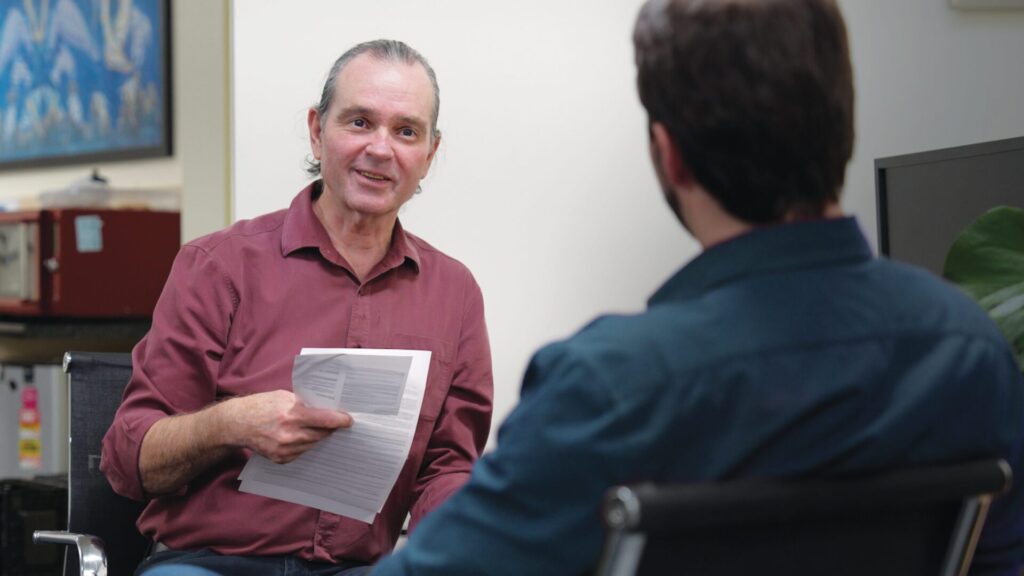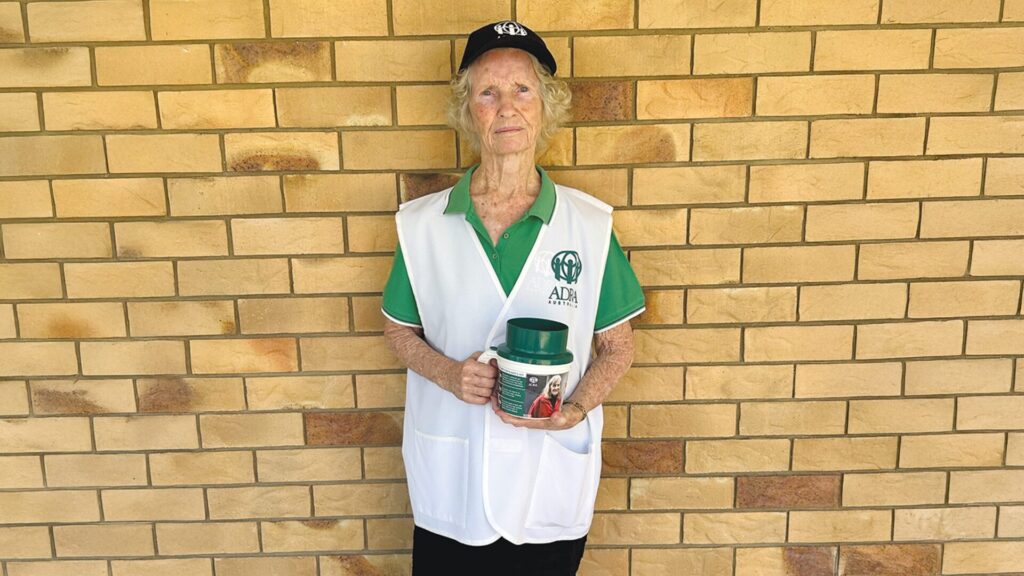Sunday, October 16: The Sunday-morning traffic is sporadic at first but builds steadily across the morning. We are shielded from direct sunlight by a glary grey sky and occasional breezy gusts buffet us with the grit and exhaust of the passing traffic. With each sequence of the traffic lights on Maroondah Highway, we work away along the accumulating lines of cars, shaking our collecting cans, trying to make eye contact with vehicle occupants, offering quick good mornings in response to a window opening and a few coins dropped into the can. When the light turns green, we have just a few moments to pick our way through the traffic to the safety of the footpath, then we walk back to the intersection and wait for the next red light and another line of cars.
There are occasional quick explanations of what we are collecting for and an ADRA Appeal brochure thrust into an outstretched hand. Over four hours, we work with a team of 15 people from my local church, including the pastors and some elders, a couple of young people and a few of us who are just supporters of ADRA. Many of us observe that it’s often the older vehicles, those who are not dressed up on the way home from church, the waft of cigarettes, coffee or fast food, the arms covered almost completely in tattoos that are most generous in offering a handful of loose change. By lunchtime, we have collected about $A2400 for ADRA’s ongoing work, both in our own community and around the world.

Three weeks later: In many ways, it’s a long way from the traffic lights in suburban Lilydale; but in another sense, it isn’t so far. Timor-Leste (also known as East Timor) is one of Australia’s closest neighbours, a small and young nation with a troubled recent history and many of the economic and social challenges that come with being exploited historically by much larger surrounding nations. We are visiting rural villages in the south-eastern province of Viqueque, communities in which ADRA has been working over the past couple of years with sanitation, water and agriculture projects funded through ADRA Australia.
It is the hottest, driest time of the year in communities that have been already affected this year by El Nino drought. Water wells, pumps and communal taps offer improved quality of life and greater community cooperation with the opportunity for vegetable gardens, better nutrition and a little income from selling excess produce. Despite being an ADRA supporter for many years, it’s the first time I have seen ADRA development projects up close in an international context.
Villagers talked about the significant changes in their lives in the past few years, with roads, electricity, mobile phones and water now easily accessible features of their everyday lives. To us, this kind of development can look somewhat slow and boring; for the people in those communities, it is transformative.
But, in one village, the ADRA-installed water system has not been working for two weeks and the community has had to resume their former daily chore of carrying water from the nearby river. The water system is now managed by a community committee but, with our visit, local ADRA staff are able to get the water pumping again, while the community had been waiting on outside technical assistance. As the water begins to flow, we are given a glimpse of the difference it makes. The next afternoon, as one elderly village woman tells us of how her husband dug more than 500 metres of trench to allow a tap station to be installed near their thatched hut, the water tanks are full again.

Monday, November 21: On a clear and warm Spring morning, about 200 people assemble on the lawn in front of Australia’s Parliament House in Canberra to pray for our leaders, our nation and our world. We also hear short speeches from Christian leaders and young people from a number of Pacific nations about the impact of climate change and rising sea levels on people in their nations, calling on Australia’s political leaders to honour their commitments to act and the Christians of Australia to raise their voices on behalf of their Pacific neighbours.
Hosted by Micah Australia—a coalition of 15 Christian justice-focused organisations, including ADRA Australia—the “Voices for Justice” participants are divided into about 30 small lobby groups for more than 100 meetings with parliamentarians across the day. My Melbourne-centric group could be the opening line of a joke: “An Anglican advocacy leader, a Christian engineer, a Pentecostal ministry leader and an Adventist editor walk into Parliament . . .”
Politicians have been invited to our morning event and we recognise our 9 o’clock appointment among the crowd on the lawn. After the obligatory group photos, we introduce ourselves to Mr Julian Hill, the newly elected Member for Bruce, an electorate in the south-eastern suburbs of Melbourne. He suggests we walk with him back to his office and helps us bypass the long lines for security screening at the public entrance.
After we share our concerns about Australia’s declining aid contributions and the urgency of greater action against climate change, he is supportive but, as a new backbencher, he is not making major promises or commitments. [pullquote]
Following the meeting and our other meetings during the day, we pray for each politician and his opportunity to be a voice for the most vulnerable. The direct outcomes of any of these individual meetings is vague, but as we move around the parliament building, we regularly cross paths with other Micah lobby groups. We are part of something larger today and part of significant ongoing campaigns. Our collective presence in the building is mentioned in a couple of parliamentary exchanges across the day. Among the many voices seeking the attention of our elected leaders, our presence has been noticed and our “Voices for Justice” have been heard.
I am privileged—in so many ways. Each of these stories is as much a reflection of my privilege as it is about any contribution I might have made to ADRA and its work for justice. But, foremost in these stories, I was privileged to meet and work with people for whom this work is faithfulness, passion and sacrifice.

I was privileged to work with members of my church who gave up their Sunday morning when they had so many other things they could do, collecting for a cause that many of them have not had the opportunity to see and experience in the ways that I have, and trusting that the funds are used for the best good of those who most need them. And, of course, there are also all those many people who gave just a little bit. Whatever their level of engagement, they did something good and it added up to something larger.
I was privileged to meet ADRA’s international staff who leave family far behind to live in—or regularly visit—the developing nations they seek to serve, as difficult, frustrating and lonely as that can sometimes be. We also talked with ADRA’s local staff who are focused on serving their communities, and community leaders and members who want the best for their people.
I was privileged to worship, learn and lobby with Christians from across Australia who take time off work, cover the costs of travel and use their time to raise their voice for people whose voices are rarely heard in Parliament House or in Australia’s public conversations. I also met politicians and staff members who are genuinely trying to work for the good of our nation and what they believe in.
On our last evening in Canberra, one of the ADRA Australia team presented me with a new ADRA T-shirt. It carries three biblical commands: “Give freely” (see Matthew 10:8; 2 Corinthians 9:9); “Love deeply (see Romans 12:9; James 2:15, 16); “Act mercifully” (see Micah 6:8; Luke 10:37). After about a month on the road with ADRA, I have seen these in action and I will wear the shirt a little more proudly, while seeking to live out these commands more fully and faithfully with the privileges, opportunities and resources I have.






